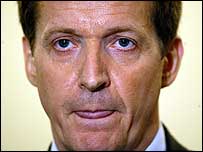Hutton reverses post mortem secrecy order
From The Times
January 27, 2010
Confidential documents on death of Dr David Kelly to be released
Frances Gibb, Legal Editor
Confidential medical evidence about the death of David Kelly, the expert in biological warfare, is to be released.
Lord Hutton, the retired law lord who chaired the inquiry into Dr Kelly’s death, has indicated that he will release to a group of doctors the medical records and results of the post-mortem examination that have to date remained unpublished. His 2004 report, commissioned by Tony Blair, concluded that Dr Kelly killed himself by cutting his wrist with a blunt gardening knife.
It was reported at the weekend that the medical reports including the post-mortem examination findings by Dr Nicholas Hunt, a pathologist, and also photographs of Dr Kelly’s body, are to remain classified for 70 years.
There is also a 30-year ban on publication of records provided to the inquiry but not produced in evidence.
The restrictions on publication were notified to a group of doctors who are challenging the Hutton verdict, arguing that the evidence does not support suicide.
A letter from a senior official at Oxfordshire Council said that Lord Hutton had requested that records provided to the inquiry that were not produced in evidence should be closed for 30 years and that the medical reports, including the post-mortem reports and photographs, be closed for 70 years.
But last night the doctors heard through their lawyers that the evidence would be released.
Last year they published a medical dossier saying that Lord Hutton’s conclusion that Dr Kelly killed himself by severing the ulnar artery in his left wrist after taking an overdose of prescription painkillers was untenable because the artery is small and hard to access; and severing it would not in any case cause death.
Dr Michael Powers, QC, one of the doctors involved, said last night: “Obviously we welcome this news that Lord Hutton is now going to disclose the medical reports and any post-mortem reports.
“We particularly welcome it if it can be assured that we shall have access to all the material, so that we consider it.
“Obviously as doctors we undertake not to make public anything that is of a personal or distressing nature to the family.”
Dr Kelly, a former UN weapons inspector, was exposed as the source of a BBC report questioning the government claim that Saddam Hussein had weapons of mass destruction that could be deployed in 45 minutes.
http://www.timesonline.co.uk/tol/news/politics/article7003861.ece
January 27, 2010
Confidential documents on death of Dr David Kelly to be released
Frances Gibb, Legal Editor
Confidential medical evidence about the death of David Kelly, the expert in biological warfare, is to be released.
Lord Hutton, the retired law lord who chaired the inquiry into Dr Kelly’s death, has indicated that he will release to a group of doctors the medical records and results of the post-mortem examination that have to date remained unpublished. His 2004 report, commissioned by Tony Blair, concluded that Dr Kelly killed himself by cutting his wrist with a blunt gardening knife.
It was reported at the weekend that the medical reports including the post-mortem examination findings by Dr Nicholas Hunt, a pathologist, and also photographs of Dr Kelly’s body, are to remain classified for 70 years.
There is also a 30-year ban on publication of records provided to the inquiry but not produced in evidence.
The restrictions on publication were notified to a group of doctors who are challenging the Hutton verdict, arguing that the evidence does not support suicide.
A letter from a senior official at Oxfordshire Council said that Lord Hutton had requested that records provided to the inquiry that were not produced in evidence should be closed for 30 years and that the medical reports, including the post-mortem reports and photographs, be closed for 70 years.
But last night the doctors heard through their lawyers that the evidence would be released.
Last year they published a medical dossier saying that Lord Hutton’s conclusion that Dr Kelly killed himself by severing the ulnar artery in his left wrist after taking an overdose of prescription painkillers was untenable because the artery is small and hard to access; and severing it would not in any case cause death.
Dr Michael Powers, QC, one of the doctors involved, said last night: “Obviously we welcome this news that Lord Hutton is now going to disclose the medical reports and any post-mortem reports.
“We particularly welcome it if it can be assured that we shall have access to all the material, so that we consider it.
“Obviously as doctors we undertake not to make public anything that is of a personal or distressing nature to the family.”
Dr Kelly, a former UN weapons inspector, was exposed as the source of a BBC report questioning the government claim that Saddam Hussein had weapons of mass destruction that could be deployed in 45 minutes.
http://www.timesonline.co.uk/tol/news/politics/article7003861.ece




















